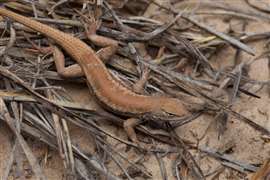Lizard, oil & gas industry in Texas showdown
August 27, 2024
Rare dunes sagebrush lizard pitting industry against the U.S. Fish and Wildlife Service in Permian.
A two-and-a-half-inch lizard is casting a long shadow over the Permian Basin, thanks to an endangered species designation by the U.S. Fish and Wildlife Service (FWS).
 The dunes sagebrush lizard is a rare species found only in extreme southeast New Mexico and west Texas. (Photo: Ryan Hagerty/USFWS)
The dunes sagebrush lizard is a rare species found only in extreme southeast New Mexico and west Texas. (Photo: Ryan Hagerty/USFWS)
The reptile in question is the rare dunes sagebrush lizard, which makes its home in parts of West Texas and eastern New Mexico. The lizard’s habitat is in the Permian Basin, which has more than 7,000 producing oil and gas fields in Texas. As such, the oil and gas industry has voiced strong opposition to the endangered species listing and the possible restrictions on oil and gas operations.
The dunes sagebrush lizard is a rare species found only in the shinnery oak and sand dune ecosystems in extreme southeast New Mexico and west Texas, according to the FWS. The lizard occurs in about 4% of lands that make up the 86,000-square-mile Permian Basin. Primary threats to the lizard include loss of habitat associated with oil and gas development, sand mining and changing climate, the service maintains.
The industry’s concern (ire) is so great that it has sought the help of members of Congress and the Texas Railroad Commission (the state’s oil and gas regulator) in trying to overturn the endangered species listing.
Long-standing issue
The question (and controversy) over the lizard’s standing goes back some 40 years. Environmental groups have repeatedly urged the FWS to address this existential (for the lizard, anyway) issue. On May 17, dunes sagebrush lizard advocates got their wish when the FWS announced it was listing the animal as an endangered species.
“The Endangered Species Act is an important tool in preventing the extinction of imperiled species like the dunes sagebrush lizard,” said Amy Lueders, the service’s southwest regional director. “The service will continue working collaboratively with Tribes, industry, stakeholders, and private landowners while ensuring protections for the lizard and its habitat.”
The designation of critical habitat was found to be “prudent but not determinable” at this time, said the FWS, which has up to one year from the time of the listing to propose critical habitat.
Prior to the endangered species listing, in New Mexico and Texas, around 100 ranchers and 100 oil and gas partners in New Mexico and Texas had already enrolled in voluntary agreements to implement conservation practices “with assurances that if the species is listed, they can continue to manage their land outlined in their agreements with no additional requirements or restrictions,” the FWS said.
“In New Mexico, these voluntary enrollments cover nearly 85% of the dune sagebrush lizard’s range within the state,” the FWS continued. “In Texas, enrollment focuses on avoiding and mitigating any unavoidable impacts on lizard habitat. Although new enrollment in these voluntary agreements ends when the listing rule is final and effective, the service has multiple tools and programs to work with industry, private landowners, and public agencies to streamline and ensure compliance with the ESA (Endangered Species Act).”
The FWS maintains that through advanced horizontal drilling techniques, oil and gas wells are still able to reach most oil and gas reserves without disrupting lizard habitat.
Strong opposition
The oil and gas industry and its supporters don’t see eye to eye with the FWS.
The Permian Basin Petroleum Association (PBPA) said in 2023 (when the FWS first announced its intention to list the lizard as endangered), that: “A listing of the dunes sagebrush lizard under the ESA is an incredible threat to the production of oil, natural gas, wind and solar energy developed in the Permian Basin, and is an incredible threat to our nation’s energy independence and national security.”
Members of the Texas Railroad Commission also railed against the FWS’ action and voted unanimously to ask the Texas Attorney General’s office challenge the designation.
Railroad Commissioner Wayne Christian said: “This doesn’t have a thing to do with ‘saving lizards’; it’s about shutting down U.S. oil and gas production to win political brownie points, which will only increase inflation and jeopardize billions of lives globally.”
And in early July, U.S. Senator Ted Cruz (R-Texas) introduced legislation to reverse the endangered species designation.
“This disastrous rule threatens American jobs and undermines the production of energy in the Permian Basin,” Cruz said. U.S. Representative August Pfluger (R-Texas) previously introduced companion legislation in the House of Representatives.
Brian Ford is editor in chief for Industrial Info Resources, which provides up-to-date project information on a wide range of industries across the globe. He has worked as a reporter and editor for newspapers and other publications since 1979.
MAGAZINE
NEWSLETTER
CONNECT WITH THE TEAM





